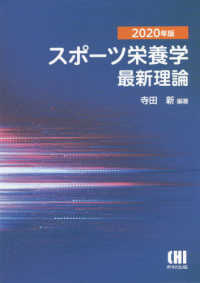- ホーム
- > 洋書
- > 英文書
- > Religion / Ethics
Full Description
Isaac of Nineveh's Ascetical Eschatology demonstrates that Isaac's eschatology is an original synthesis based on ideas garnered from a distinctively Syriac cultural milieu. Jason Scully investigates six sources relevant to the study of Isaac's Syriac source material and cultural heritage. These include ideas adapted from Syriac authors like Ephrem, John the Solitary, and Narsai, but also adapted from the Syriac versions of texts originally written in Greek, like Evagrius's Gnostic Chapters, Pseudo-Dionysius's Mystical Theology, and the Pseudo-Macarian homilies. Isaac's eschatological synthesis of this material is a sophisticated discourse on the psychological transformation that occurs when the mind has an experience of God. It begins with the premise that asceticism was part of God's original plan for creation. Isaac says that God created human beings with infantile knowledge and that God intended from the beginning for Adam and Eve to leave the Garden of Eden. Once outside the garden, human beings would have to pursue mature knowledge through bodily asceticism.
Although perfect knowledge is promised in the future world, Isaac also believes that human beings can experience a proleptic taste of this future perfection. Isaac employs the concepts of wonder and astonishment in order to explain how an ecstatic experience of the future world is possible within the material structures of this world. According to Isaac, astonishment describes the moment when a person arrives at the threshold of eschatological perfection but is still unable to comprehend the heavenly mysteries, while wonder describes spiritual comprehension of heavenly knowledge through the intervention of divine grace.
Contents
Introduction
1: The East-Syriac Reception of Evagrius' Gnostic Chapters in the Seventh Century
2: Felix Culpa: The Infantile Adam and Ascetisim as an Inherent Part of Creation
3: Isaac of Nineveh's Eschatology: The Influence of John the Solitary
4: The Syriac Sources for Isaac of Nineveh's Development of Wonder and Astonishment
5: The Greek Sources for Isaac of Nineveh's Development of Wonder and Astonishment
6: Excursus: Isaac of Nineveh's Moral Psychology
7: Wonder as the Cultimation of Isaac of Nineveh's Eschatology
Conclusion
Bibliography








